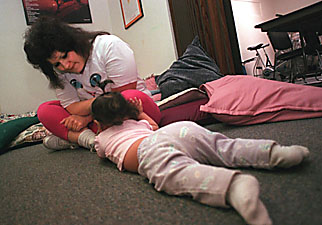 |
Treatment programs' funding will run out

Debbie and Sabrina have fun in the playroom of Las Amigas.
![]() There are not enough treatment beds in Tucson for pregnant women who drink.
There are not enough treatment beds in Tucson for pregnant women who drink.
![]() And the number of beds is dwindling.
And the number of beds is dwindling.
![]() Desert Willow, which provides residential treatment for 20 pregnant woman or women with young children, has stopped accepting clients and plans to close its doors in June 1998, when the program's five-year federal grant ends.
Desert Willow, which provides residential treatment for 20 pregnant woman or women with young children, has stopped accepting clients and plans to close its doors in June 1998, when the program's five-year federal grant ends.
![]() And CODAC Behavioral Health Services' yearlong residential treatment program for pregnant women and new mothers, Las Amigas, will lose its funding Sept. 30 of that year.
And CODAC Behavioral Health Services' yearlong residential treatment program for pregnant women and new mothers, Las Amigas, will lose its funding Sept. 30 of that year.
![]() Unless new funding can be found, both programs will end.
Unless new funding can be found, both programs will end.
![]() CODAC also operates Wildflowers, a residential treatment program for 14 women and five young children, which will continue to operate.
CODAC also operates Wildflowers, a residential treatment program for 14 women and five young children, which will continue to operate.
![]() Las Amigas has been successful at helping women stay drug- and alcohol-free during their pregnancies and after.
Las Amigas has been successful at helping women stay drug- and alcohol-free during their pregnancies and after.
![]() Of the women who have completed the program, about 80 percent continue to be drug- and alcohol-free after one year, said Ilana Boss Markowitz, project director.
Of the women who have completed the program, about 80 percent continue to be drug- and alcohol-free after one year, said Ilana Boss Markowitz, project director.
![]() At capacity, 16 women and 21 children live at Las Amigas. Ten addicted women are on the waiting list at any given time, Markowitz said.
At capacity, 16 women and 21 children live at Las Amigas. Ten addicted women are on the waiting list at any given time, Markowitz said.
![]() Funding for the programs came in the early 1990s, when research showed that women who needed treatment weren't seeking it, Markowitz said.
Funding for the programs came in the early 1990s, when research showed that women who needed treatment weren't seeking it, Markowitz said.
![]() "They didn't want to be separated from their children," she said.
"They didn't want to be separated from their children," she said.
![]() So the federal government awarded grants to determine the success of long-term residential treatment that would not separate women from their young children.
So the federal government awarded grants to determine the success of long-term residential treatment that would not separate women from their young children.
![]() "Since we're a demonstration project," said Markowitz, "they wanted to see if pouring money into treatment would save taxpayers money in the long run. We've had a lot of success."
"Since we're a demonstration project," said Markowitz, "they wanted to see if pouring money into treatment would save taxpayers money in the long run. We've had a lot of success."
![]() Research, she said, shows that for every dollar spent on treatment, $7 is saved in emergency hospital visits and jail costs.
Research, she said, shows that for every dollar spent on treatment, $7 is saved in emergency hospital visits and jail costs.
![]() She said it is critical that long-term care be provided in a setting that helps children thrive.
She said it is critical that long-term care be provided in a setting that helps children thrive.
![]() "The longer someone is in treatment, the more successful they're going to be," Markowitz said. "And it takes that long for someone to become stable enough to learn new skills."
"The longer someone is in treatment, the more successful they're going to be," Markowitz said. "And it takes that long for someone to become stable enough to learn new skills."
![]() Most women in treatment have a history of sexual or physical abuse, are high school dropouts, were victims of domestic violence in childhood and were exposed to drugs at a young age, she said.
Most women in treatment have a history of sexual or physical abuse, are high school dropouts, were victims of domestic violence in childhood and were exposed to drugs at a young age, she said.
![]() Without treatment, successful parenting is nearly impossible. But through treatment, women learn to care for themselves and their children.
Without treatment, successful parenting is nearly impossible. But through treatment, women learn to care for themselves and their children.
![]() Finding emergency funding is the only way Desert Willow, which provides treatment to 20 women and 40 children, will be saved, said Robin McGrath, project director.
Finding emergency funding is the only way Desert Willow, which provides treatment to 20 women and 40 children, will be saved, said Robin McGrath, project director.
![]() "We're still hoping to stay open, but there's only seven months left, and I'm afraid it's not looking good," McGrath said.
"We're still hoping to stay open, but there's only seven months left, and I'm afraid it's not looking good," McGrath said.
![]() "I'm afraid there will be nowhere for women and children to go."
"I'm afraid there will be nowhere for women and children to go."
